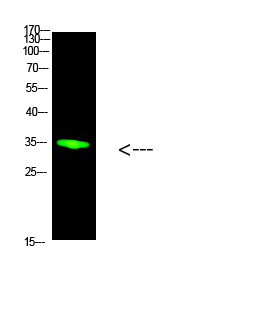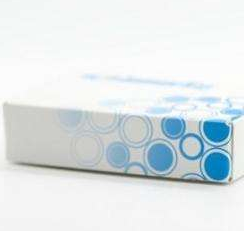Proliferating Cell Nuclear Antigen (ABT221) IHC kit
- Catalog No.:IHCM6705
- Applications:IHC
- Reactivity:Human;Mouse;Rat;
- Target:
- PCNA
- Fields:
- >>DNA replication;>>Base excision repair;>>Nucleotide excision repair;>>Mismatch repair;>>Cell cycle;>>Tight junction;>>Hepatitis B
- Gene Name:
- PCNA
- Protein Name:
- ATLD2;cb16;Cyclin;DNA polymerase delta auxiliary protein;etID36690.10;fa28e03;fb36g03;HGCN8729;MGC8367;Mutagen-sensitive 209 protein;OTTHUMP00000030189;OTTHUMP00000030190;PCNA;Pcna/cyclin;PCNA_HUMAN;P
- Human Swiss Prot No:
- P12004
- Mouse Swiss Prot No:
- P17918
- Rat Swiss Prot No:
- P04961
- Immunogen:
- Synthesized peptide derived from human Proliferating Cell Nuclear Antigen AA range: 1-100
- Specificity:
- The antibody can specifically recognize human PCNA protein.
- Source:
- Mouse, Monoclonal/IgG2b, kappa
- Purification:
- The antibody was affinity-purified from ascites by affinity-chromatography using specific immunogen.
- Storage Stability:
- 2°C to 8°C/1 year
- Other Name:
- ATLD2;cb16;Cyclin;DNA polymerase delta auxiliary protein;etID36690.10;fa28e03;fb36g03;HGCN8729;MGC8367;Mutagen-sensitive 209 protein;OTTHUMP00000030189;OTTHUMP00000030190;PCNA;Pcna/cyclin;PCNA_HUMAN;PCNAR;Polymerase delta accessory protein;Proliferating cell nuclear antigen;wu:fa28e03;wu:fb36g03
- Background:
- The protein encoded by this gene is found in the nucleus and is a cofactor of DNA polymerase delta. The encoded protein acts as a homotrimer and helps increase the processivity of leading strand synthesis during DNA replication. In response to DNA damage, this protein is ubiquitinated and is involved in the RAD6-dependent DNA repair pathway. Two transcript variants encoding the same protein have been found for this gene. Pseudogenes of this gene have been described on chromosome 4 and on the X chromosome. [provided by RefSeq, Jul 2008],
- Function:
- disease:Antibodies are present in sera from patients with systemic lupus erythematosus.,function:This protein is an auxiliary protein of DNA polymerase delta and is involved in the control of eukaryotic DNA replication by increasing the polymerase's processibility during elongation of the leading strand.,online information:PCNA entry,PTM:Upon methyl methanesulfonate-induced DNA damage, mono-ubiquitinated by the UBE2B-RAD18 complex on Lys-164. This induces non-canonical poly-ubiquitination on Lys-164 through 'Lys-63' linkage of ubiquitin moieties by the E2 complex UBE2N-UBE2V2 and the E3 ligases RNF8 and SHPRH, which are required for DNA repair.,similarity:Belongs to the PCNA family.,subunit:Homotrimer. Interacts with KCTD10. Interacts with PPP1R15A (By similarity). Forms a complex with activator 1 heteropentamer in the presence of ATP. Interacts with POLH, POLK, DNMT1, ERCC5/XPG, FEN1, C
- Subcellular Location:
- Nuclear
- Expression:
- Tonsil/ Colon
- June 19-2018
- WESTERN IMMUNOBLOTTING PROTOCOL
- June 19-2018
- IMMUNOHISTOCHEMISTRY-PARAFFIN PROTOCOL
- June 19-2018
- IMMUNOFLUORESCENCE PROTOCOL
- September 08-2020
- FLOW-CYTOMEYRT-PROTOCOL
- May 20-2022
- Cell-Based ELISA│解您多样本WB检测之困扰
- July 13-2018
- CELL-BASED-ELISA-PROTOCOL-FOR-ACETYL-PROTEIN
- July 13-2018
- CELL-BASED-ELISA-PROTOCOL-FOR-PHOSPHO-PROTEIN
- July 13-2018
- Antibody-FAQs
- Products Images

- TRAF6 regulates autophagy and apoptosis of melanoma cells through c-Jun/ATG16L2 signaling pathway. Cong Peng IHC Mouse 1:350 SK-Mel-5 cell-xenograft
.jpg)
- Human colon tissue was stained with Anti-Proliferating Cell Nuclear Antigen (ABT221) Antibody
.jpg)
- Human colon tissue was stained with Anti-Proliferating Cell Nuclear Antigen (ABT221) Antibody
.jpg)
- Human colon tissue was stained with Anti-Proliferating Cell Nuclear Antigen (ABT221) Antibody

